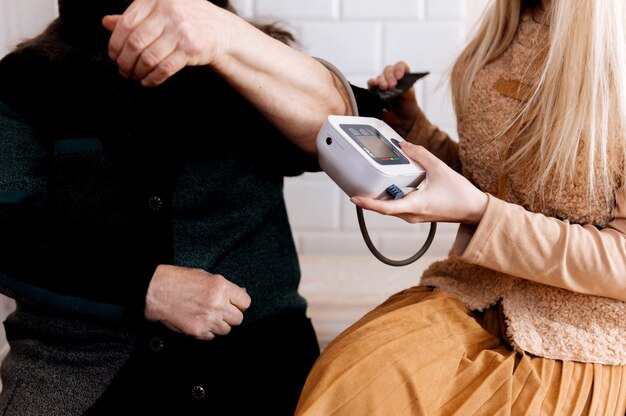Understanding Hypertension: Is It Treatable?
High blood pressure, commonly known as hypertension, is often termed the "silent killer" due to its lack of obvious symptoms and the severe complications it can cause if left untreated. If you've been recently diagnosed with hypertension or are concerned about your blood pressure levels, you're likely wondering: "Is hypertension treatable?" Let's explore this topic from all angles, offering useful information about hypertension management and empowering you with knowledge to address this health challenge.
Unpacking Hypertension: What Does It Mean?
Before diving into treatment possibilities, it's crucial to understand what hypertension is and why it's important. Hypertension is a condition where the force of blood against your artery walls is consistently too high. This can damage your blood vessels and lead to severe health issues, such as heart disease, stroke, and kidney problems.
Key Facts About Hypertension
- Blood pressure is measured in millimeters of mercury (mmHg) and recorded as two numbers: systolic and diastolic pressures.
- A healthy reading typically falls below 120/80 mmHg.
- Blood pressure readings at or above 130/80 mmHg over time indicate hypertension.
How Is Hypertension Diagnosed?
Hypertension often goes unnoticed until serious complications arise, making regular monitoring critical. Diagnosis typically involves:
- Measuring blood pressure using a cuff device.
- Multiple readings taken over several visits to confirm elevated levels.
- Additional tests and assessments to check for potential damage or underlying conditions.
Treating Hypertension: Is It Possible?
The short answer is yes, hypertension is treatable. Treatment involves various strategies aimed at reducing and managing blood pressure levels to prevent complications. Here's a look at the most common treatments.
Lifestyle Changes
Adopting healthier habits is the first line of defense against hypertension.
Dietary Adjustments
- Reduce sodium: High salt intake increases blood pressure; aim for less than 2,300 mg of sodium per day.
- Eat a balanced diet: Focus on fruits, vegetables, whole grains, and lean proteins.
- Limit alcohol consumption: Excessive alcohol can raise blood pressure.
Physical Activity
- Aim for at least 150 minutes of moderate aerobic exercise weekly, such as walking, jogging, or cycling.
- Incorporate strength training activities twice a week.
Weight Management
- Losing weight can have a significant impact on blood pressure, especially for those carrying excess pounds.
Stress Management
- Relaxation techniques, including meditation, deep breathing, or yoga, can help regulate stress and lower blood pressure.
Medications
When lifestyle modifications aren't enough, healthcare providers may recommend medications to control blood pressure.
Common Medication Types
- Diuretics: Help your body expel excess sodium and water to lower blood pressure.
- Beta-blockers: Reduce heart rate and decrease the heart's workload.
- ACE inhibitors: Block the production of a hormone that narrows blood vessels.
- Calcium channel blockers: Prevent calcium from entering heart and blood vessel cells, promoting relaxation.
Importance of Regular Monitoring
Monitoring your blood pressure regularly helps determine how well your treatment plan is working. It's vital to maintain scheduled healthcare appointments and engage with professional monitoring tools at home when suggested.
The Role of Preventative Healthcare
Preventing hypertension or managing it effectively requires a proactive approach to healthcare.
Regular Health Screenings
Annual physicals and regular health screenings are essential for detecting potential health concerns early.
- Conduct regular blood pressure checks.
- Monitor cholesterol levels and blood glucose for additional cardiovascular risks.
Understanding Risk Factors
Certain factors can elevate your risk for hypertension, including:
- Genetic predisposition: Family history plays a role.
- Age: Risk increases with age.
- Lifestyle choices: Sedentary life, poor diet, smoking.
- Chronic conditions: Diabetes, kidney disease, or hyperlipidemia.
Being aware of these risks helps in taking preemptive measures.
Addressing Hypertension: A Multi-Faceted Approach
Treating hypertension effectively requires a comprehensive plan that combines lifestyle alterations, medication, and ongoing monitoring. Here are additional considerations that complement primary treatment avenues.
Alternative Therapies
Some individuals explore complementary therapies to support conventional treatments.
- Herbal remedies such as garlic or hibiscus are sometimes used, but should only be integrated with professional advice.
- Acupuncture and biofeedback may promote relaxation and aid in stress reduction.
Educating Yourself and Others
Understanding hypertension is crucial for making informed decisions. Educational resources and community support can empower you to manage your condition effectively.
- Join support groups for shared experiences and encouragement.
- Stay informed about new research and advances in hypertension treatments.
Final Insights: Taking Control of Your Health
While hypertension is a serious condition, it is indeed treatable and manageable with the right strategies. By committing to lifestyle changes, adhering to treatment plans, and engaging with healthcare providers, you can take control of your health and significantly decrease your risk of developing life-threatening complications. Remember, knowledge is power, and making informed choices is key to living a healthier, more fulfilling life.
Key Takeaways Summary
- 🩺 Hypertension is treatable with lifestyle changes, medications, and regular monitoring.
- 🥗 Adopt a heart-healthy diet low in sodium and rich in fruits and vegetables.
- 🏃 Stay active with regular exercise to help maintain or lower blood pressure.
- 💊 Medications may be necessary to manage blood pressure effectively.
- ⚖️ Frequent monitoring of blood pressure helps track treatment success.
- 📚 Educate yourself and engage in community resources for additional support.
- 😊 Maintain a positive outlook and take proactive steps towards better health.

Related Articles
- Are Eggs Bad For Hypertension
- Are Endocrine Disorders Causing Hypertension Rare
- Can Alcohol Cause Hypertension
- Can Allergies Cause Hypertension
- Can Anemci People Get Hypertension
- Can Anemia Cause Hypertension
- Can Antibiotics Cause Hypertension
- Can Anxiety Cause Hypertension
- Can Asthma Cause Hypertension
- Can Atherosclerosis Cause Hypertension
